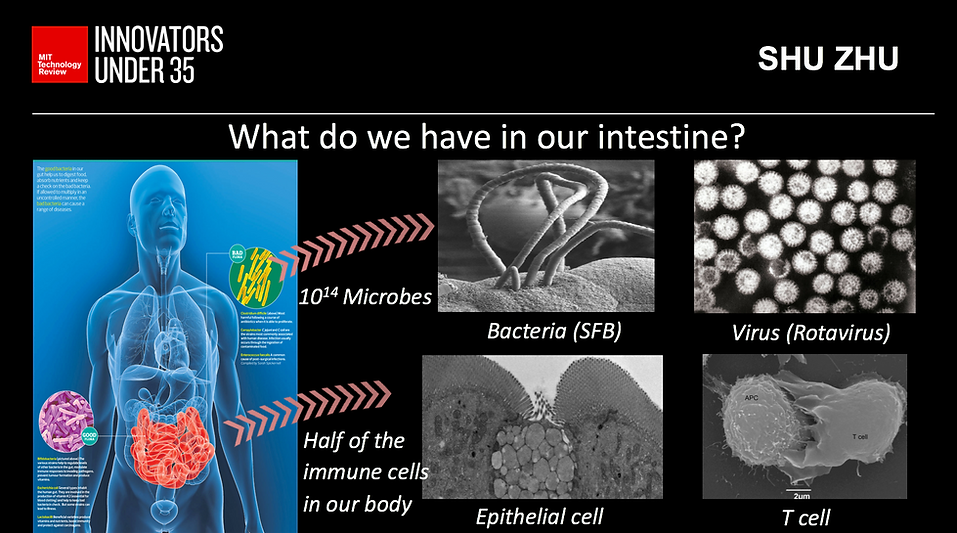Research

The host immune system provides protection against diverse infectious agents such as bacteria, viruses, fungi, and parasites. However, an excessive immune reaction towards these foreign invaders can cause detrimental collateral damage to the surrounding tissue and organs. Our laboratory investigates how these invaders are sensed by our immune system, how a balanced immune response is generated, and what happens when this balance is disrupted. We are particularly interested in understanding why some infectious agents cause disease (e.g. Salmonella, Helicobacter, Rotavirus), while others are harmless or beneficial, such as the trillions of commensal bacteria and other microbes that colonize our intestine, skin, and lung, also referred to as the 'microbiota'. By learning the difference between helpful immune responses versus harmful responses, we will be able to design better treatments for IBD, cancer, obesity and other chronic inflammatory conditions.
人体肠道等器官针对微生物的黏膜免疫是一个古老而重要的课题,随着测序技术,遗传工具及新的疾病模型的发展,我们对于人体免疫系统是如果感知微生物并维持合适程度的免疫反应有了新的理解。我们实验室致力于研究人体免疫系统如何识别并对微生物作出适当平衡的免疫反应,防止过度反应对自身组织器官的伤害。同时我们会研究由于遗传或者环境因素打破这种平衡之后对健康和疾病的影响。另外我们实验室研究为什么在某些情形下有些微生物会导致疾病,而另外一些微生物却是无害甚至对人体有利的。通过研究这些功能不同的微生物诱导的免疫反应,我们可以针对微生物本身或者其诱导的免疫反应设计更好的治疗方式来治疗肠炎,肿瘤,肥胖和其他慢性炎症疾病。

Our research focuses on the virus/microbiota/immune system interplay on the mucosal surface in context of human diseases such as IBD, norovirus and rotavirus infection, and colorectal cancer.
We will use genetic approach like CRISPR, different mouse models, and next-generation sequencing to define the mechanisms and pathways that control disease pathogenesis and immunity. Specific directions will be: 1) Elucidate how immune systems including Nod-like receptors and T cells sense and respond to microorganisms or their products in intestine; 2) Determine how microorganisms including enteric viruses influence the immune system and further contribute to disease progression.
We will also take advantage of the antibody and sequencing platforms in IAT, to identify new targets and develop new strategies to treat human diseases. Specific directions will be: 1) Targeting innate sensors with small molecules to treat infectious and inflammatory diseases; 2) Targeting T cells with newly generated antibodies to treat inflammatory disease and tumor; 2) Identifying disease driven microbes.
人体的肠道作为人体最大的粘膜免疫器官,聚集了远超过人体细胞数目的微生物,当前的研究显示这些微生物不仅和人体保持共生关系,为人体正常生理过程比如营养物质的代谢和吸收提供帮助,在特定情况下也会对人类疾病造成负面的影响,比如说促进免疫性疾病(IBD),代谢性疾病(肥胖),神经性疾病(抑郁),甚至肿瘤。另外大量肠道微生物的存在导致肠道共同进化形成拥有由功能各异的上皮细胞组成的黏膜屏障,以及由全身一半以上的免疫细胞组成的复杂精密的免疫系统。实验室的兴趣在于利用小鼠模型来研究在正常情况下,肠道黏膜屏障如何隔绝微生物,免疫细胞和上皮细胞如何识别微生物,以及肠道T细胞如何介导和调节针对微生物免疫反应。另外由于肠道微生态失调和人类疾病的紧密联系,实验室对于肠道微生态失调是如何形成,以及失调的微生态是如何影响肠道免疫反应和人类疾病也非常感兴趣。以期通过靶向宿主免疫反应,或者直接靶向微生态,来实现对于人类疾病比如自身免疫疾病和肿瘤的干预。






实验室主要研究方向:
-
肠道先天免疫系统如何识别病原和肠道各异的微生物并产生合适的免疫反应?(王亚龙小组,朱书小组)
-
肠道T细胞免疫反应如何被激活以及维持肠道正常的生理活动?如何通过调节肠道微环境以及肿瘤微环境的T细胞免疫反应强度来干预炎症性疾病和肿瘤?(马洪第小组)
-
疾病状态下肠道微生态谱(细菌和病毒),微生态失调的形成机制以及微生态失调如果对免疫系统和疾病造成影响?(陶万银小组)

